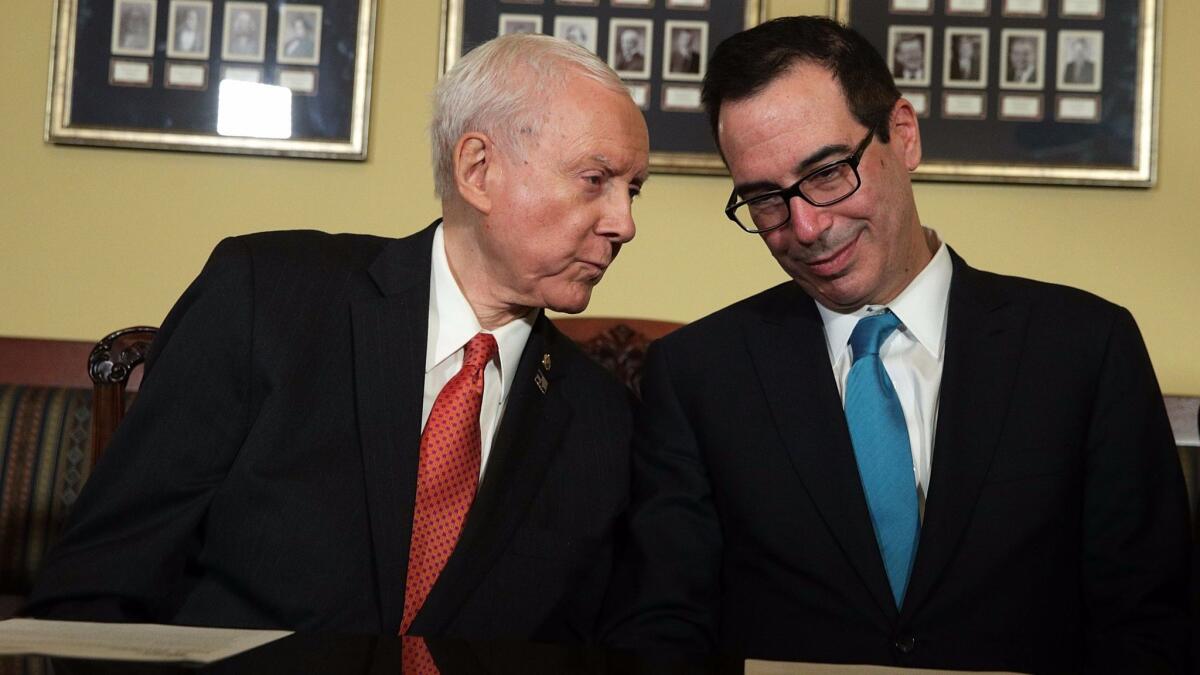Senate Republicans must still figure out how to eliminate tax bill’s deficit after 10 years

As
But the biggest hurdle to passing a tax bill could be what happens in year 11.
An arcane Senate provision known as the Byrd rule requires that any bill approved by the Senate by a simple majority vote using the budget reconciliation process must not increase the deficit after 10 years.
With near universal Democratic opposition, Senate Republicans need to use reconciliation to pass a tax bill. That means any tax package must not only fall below the $1.5 trillion threshold for the first decade, it must pay for itself after that.
And although House and Senate Republicans are confident they can meet the initial 10-year target, no one is quite sure how to comply with the Byrd rule, short of possibly having the long-coveted tax cuts expire after 10 years, as has happened before.
If Republicans don’t find a solution, Senate Democrats could use the rule to try to prevent them from using the reconciliation process. That would require Republicans to have 60 votes for a tax bill rather than 50, assuming Vice President Mike Pence breaks a tie.
No congressional analysis has been done yet of the budgetary impact of the Senate Republican tax bill in 2028.
But the nonpartisan Committee for a Responsible Federal Budget has estimated that the House bill would add about $155 billion to the deficit in 2028, violating the Byrd rule.
And based on congressional number-crunching already done for 2018-27, the Senate bill would most likely add to the deficit in 2028, said Douglas Holtz-Eakin, president of the conservative-leaning American Action Forum economic think tank and a former director of the
“They have a problem in the Senate,” Holtz-Eakin said of Republicans.
The Senate Republican bill would increase the deficit by $167 billion in 2026 and $217 billion in 2027, according to the nonpartisan Joint Committee on Taxation.
Those large budget deficits won’t “magically go away” in 2028, Holtz-Eakin said.
Republicans have predicted that the tax cuts will promote so much economic growth that all costs will be offset by new revenue. But history has shown that hasn’t happened and such optimistic projections may not be enough to satisfy the Byrd rule.
In 2001, Republicans got around the Byrd rule problem by having major individual tax cuts pushed by President George W. Bush expire after 10 years.
“Literally, all we could do was just sunset the provisions after 10 years or otherwise we would have jeopardized the whole bill,” said G. William Hoagland, who worked for the Senate Budget Committee at the time and now is senior vice president at the Bipartisan Policy Center think tank.
But
Also, a 10-year expiration might not work this time. The Joint Committee on Taxation said in April that cutting the corporate tax rate to 20% even for just three years — from 2018-20 — would lead to lower federal revenue for several years afterward.
Senate Finance Committee Chairman
Asked how he would resolve the problem, Hatch said, “You’ll have to wait and see. We’re working on that as we speak. It’s not an easy thing.”
It’s just one of the obstacles for Republicans as the House pushes toward a vote on its bill this week and the Senate Finance Committee began considering its own legislation on Monday.
Trump reinserted himself into the tax debate with requests for additional changes that congressional Republican leaders already have rejected because of their cost or a lack of party support.
In a tweet Monday, Trump suggested that the top individual tax rate be reduced to 35% from the 39.6% level in the House bill and 38.5% in the Senate bill. And Trump wants the legislation to repeal the mandate in the Affordable Care Act that all Americans have health insurance.
The bills are centered on a big reduction in the corporate tax rate and a change in individual tax brackets as well as the scrapping or scaling back of some popular deductions for individuals. There are key differences between the House and Senate bills that would have to be resolved.
Trump is scheduled to travel to Capitol Hill on Thursday to meet with House Republicans ahead of the vote. Rep.
"I’m looking forward to bringing this bill to the House floor and getting it out of this chamber this week," Brady said.
Holtz-Eakin suggested that Republicans could try to resolve the Byrd rule problem in the Senate by proposing some sort of tax increase that would take effect in 2028 that would offset any deficit problem that year. Republicans then would have 10 years to figure out another solution before the tax increase hit, he said.
“It solves their problem on paper but they would hope [the tax increase] never happens,” he said.
Twitter: @JimPuzzanghera
UPDATES:
2:55 p.m.: This article was updated with comments from Rep. Kevin Brady and to note that President Trump will meet with House Republicans on Thursday.
1:35 p.m.: This article was updated with comments from Sen. Orrin Hatch and G. William Hoagland of the Bipartisan Policy Center.
This article originally was published at 12:25 p.m.
Inside the business of entertainment
The Wide Shot brings you news, analysis and insights on everything from streaming wars to production — and what it all means for the future.
You may occasionally receive promotional content from the Los Angeles Times.









